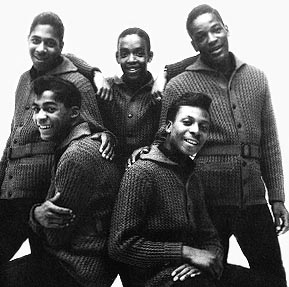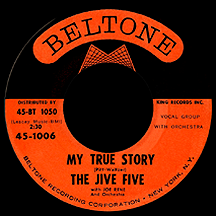THE JIVE FIVE
My True Story
Eugene Pitt hailed from Brooklyn's Bedford-Stuyvesant neighborhood, musically influenced by his father, a gospel singer, who taught Eugene and his sisters how to harmonize; they performed gospel songs in churches until about 1950, when he entered his restless teenage years. The atmosphere of Brooklyn's streets, with doo wop singers everywhere, stirred a desire for rhythm and blues stardom and by mid-decade he had joined a group called The Akrons with brothers Ray and Charles Murphy (father of future comedian and movie star Eddie Murphy). A little later Eugene sang with a group headed by Claude Johnson, but they separated when Johnson left for Long Island to join The Genies, the outfit that later scored a national hit with "Who's That Knocking."
In 1959 Pitt put together his own group, The Jive Five, with friends from the neighborhood. He and Jerome Hanna sang tenor, supported by Richard Harris, Thurmon "Billy" Prophet and bass singer Norman Johnson. Not much happened at first; Pitt was working as a stock clerk in a supermarket in early '61 when all five jivers auditioned for Les Cahan and Joe Rene at the Beltone Studio on Broadway in New York. Cahan, who'd been running the studio for several years, had decided to branch out with Beltone Records and made a spectacular splash shortly afterwards with Bobby Lewis's "Tossin' and Turnin'," the biggest hit of the entire year. One of the songs the Jive Five sang that day was an original ballad by Pitt and Oscar Waltzer, "My True Story," based on Eugene's own experience of losing a girlfriend to one of his (former?) pals.
Doo wop was at the peak of its early 1960s "revival," a time of renewed interest in many '50s recordings. "My True Story," with backing by Rene's band, had an addicting 'Cry, cry-y-y...' vocal hook (often resulting in record store customers who didn't know the actual title offering their own wailing "Cry-cry-cry" in attempts to identify the song). It captured the essence of older doo wop but got off to a slow start at the beginning of summer '61; by September, though, it had gained momentum, moving into the top ten on the pop charts while hitting number one R&B. The uptempo flip side "When I Was Single" lamented married life (without mention of a "Mother-In-Law" as Ernie K-Doe had done with great success a few months earlier) and had a following of its own.
The quintet followed with the low-charting "Never, Never" at the end of the year, an outstanding track regardless of its similarity to the debut single. Many of the Beltone B sides could have been hits under the right circumstances, including this 45's flip, "People From Another World," a wild slice of flying saucer paranoia. "Hully Gully Callin' Time," with the expanded label credit The Jive Five with Eugene Pitt, was the group's contribution to a current dance craze. Next came the best ballad since the initial release, "What Time Is It?" Pitt's falsetto (often used to supplement his lead vocals) is at full throttle on this track, which might have been much bigger had it been possible to turn the clock back a year or two prior to the fall of '62. After this, Billy Prophet left to pursue a solo career and, tragically, Jerome Hanna developed walking pneumonia and passed away, leaving the group in search of replacements. Andre Coles signed on briefly. Casey Spencer joined for a longer stretch.
Figuring ballads were the Five's forte, Cahan put out "These Golden Rings" late in the year and it did well, making an appearance on the R&B charts. "Rain," with its hypnotic 'drip...drop...' backing vocals by J.R. Bailey, Bobby Phillips and Charles Brooks, all former members of The Cadillacs, appeared in early 1963 as Beltone Records fell deeper into financial straits with distributor King Records. With no major hits since the Bobby Lewis and Jive Five smashes of '61, Cahan had stood by as finances gradually dwindled. The label ceased operation in early '64 but Cahan kept the recording studio going as before.

An "extended family" of singers came and went over the next couple of decades, the one constant being lead singer Eugene Pitt. After a one-shot '64 release on the tiny Sketch label, "United" (remaking the 1957 hit by Otis Williams and his Charms), they signed with United Artists Records in 1965. Otis Pollard, the group's manager, was on good terms with Les Cahan and sessions for the larger label were recorded in comfortable surroundings: the Beltone studios. Pollard insisted on one major change, adding a brass section to many of the Jive Five's productions, an adjustment that gave the somewhat dated doo wop quintet a modern soul sound. During this time the lineup consisted of Pitt, Johnson, Spencer, Webster Harris and Beatrice Best (the liner notes of the group's UA album making one point clear: "Despite the name, Beatrice is all man").
The group started strong at United Artists with "I'm a Happy Man," written by Spencer; a breezy track, it put them in the context of mid-'60s soul acts and returned them to the top 40 of the pop and R&B charts. "A Bench in the Park," the most uptempo A side yet, utilized Pitt's falsetto scream in a contemporary context. Seven singles were released on UA, though follow-ups performed disappointingly. No worries, though; Pitt and company always found ways to adapt to changes in musical trends. They made some noise in '67 and '68 with soul singles "Crying Like a Baby" and "Sugar (Don't Take Away My Candy)" on the Musicor label. The death of Norman Johnson in February 1970 (the result of pneumonia he developed during a tour in Toronto, Ontario, echoing the loss several years earlier of group member Hanna), came as a blow to the others, in particular longtime singing partner Pitt; still, a single for Decca Records, "I Want You to Be My Baby," hit the R&B charts near the end of the year.
For a time in the early 1970s the group altered its moniker to The Jyve Fyve, releasing records on the Avco Embassy and Brut labels under that name before resuming the original spelling. Under the leadership of Eugene Pitt, the group has remained active throughout the years, sometimes popping up in unexpected places. In 1974, Pitt and Spencer sang backup on Gloria Gaynor's hit "Never Can Say Goodbye." In the 1980s Eugene created doo wop-style jingles for the children's channel Nickelodeon, then recorded them with The Jive Five; the short animated "bumper" videos were still running on the network as the 20th century drew to a close.


